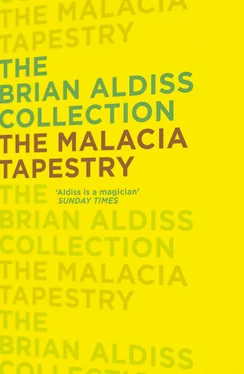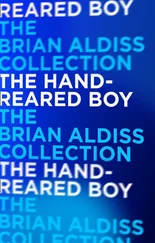‘Despite this place stinks of privilege, it preserves a part of the cultural thought of Malacia as well as Count Renardo’s state museum. Andrus Hoytola exploits cheap labour, no use to deny that – a class enemy if there was one – yet he is not a merchant just but also an artist and a man of foresight. However, to my invention …’
There was a secretiveness about him which did not suit my open nature. He manoeuvered me into a corner, saying he would lecture me upon matters not generally understood.
‘It has long been known through the learned alchemists that there are certain salts what have an empathy with or aversion against the light, so that some say they are fallen from the sun or the moon. I have developed here a process whereby a judicious mixture of silver iodine will secure on a slide of glass an image of whatever is placed before the zahnoscope. A second process involving oils of lavender and heated mercury fixes the image permanently on the glass. This is painting without hands, my dear de Chirolo …’
When he beamed at me, he looked years younger.
‘Why tell me your secret?’
He shook his head. ‘It’s not mine but Nature’s. All what wish can share it. You do not realise the oppressiveness of the state what we live in –’
‘I love my native city.’
‘I what am a foreigner should not criticise? Nevertheless, any such scientific processes what I describe are suppressed … Justice is denied – and beauty.’
He snatched from one of the exhibition racks a slide which he urged me to hold up to the light. It was a volcanic eruption. I stared through a volcano in full spate, with streams of lava furrowing its snow-clad slopes – to see one of the most beautiful faces I had ever come across, a face with a high-bridged nose, two dark-golden eyes, a mouth that was flashing a brilliant smile – though not in my direction – and a delicate head of cultivated unruly hair, jet-black and tied with a length of blue ribbon at the back.
Even as this face materialised through the volcanic eruption, it turned into profile and then went into eclipse, with only the tresses and ribbons at the back of the head available to my view. Even that was thrilling enough; but never had I seen a profile so adorable, or so originally designed, with the entire physiognomy depending from that patrician nose, without the nose being too large even by one delicious millimetre.
Lowering Mount Vesuvius slightly, I regarded the body to which this fabulous head was such an exquisite adjunct. Though I beheld it only from behind, I saw that the waist was slender, the hips generous, and the buttocks altogether matchless enough to put the snowy slopes of any volcano to shame. The whole enchanting figure was sheathed in a long, crisp dress of apricot-coloured silk which swept to the floor. My aesthetic senses, roused by the proportions of the face, were overtaken by my carnal ones and I resolved to approach this beauty at whatever cost.
All the while, Bengtsohn was talking in his cracky way, mistaking the subject of my absorption, ‘… this beautiful view was never touched by human hands …’
‘Glad I am to hear you say it.’
‘The exciting effect of fire and snow in conjunction …’
‘Oh, yes, and that conjunction …’
‘Yet this is but an imitation of an imitation …’
‘No, that I can’t believe! This is the real thing at last.’
‘You flatter me, but the zahnoscope can be made to capture the real thing, to go straight to life rather than art …’
I put the slide down. The vision was preparing to leave the gallery; I might never see her again and my happiness would never be complete.
‘You must excuse me, Maestro – I do have more preference for life than for art, just as you do. You must manage your affairs and I mine –’
Seeing I was making to go, he grasped my arm.
‘Listen, please, young man. I’m offering you work and money. All-People can’t be mistaken. You have not work or money. I want to do a new thing with the zahnoscope. I want to mercurise – that’s how I call it – I want to mercurise a whole story on slides, using real actors, not just paintings. It will be a dazzling new success, it will be revolutionary – and you can take prominently part in it. Now, come into the workshop and let me explain properly all.’
‘I’ve just seen a friend – who’s the fair creature at the far end of the gallery?’
He answered sharply. ‘That’s Armida Hoytola, daughter of the gallery-owner, a difficult, flighty girl. She’s a parasite, a class enemy. Don’t waste your time –’
‘A thousand thanks for for the meal, but I cannot work for you. All-People looked at the wrong constellation. There is other work more fitting …’
I bowed to him and left. He drew himself up, folding his arms over his ancient coat, with the funniest expression on his face.
At the far end of the gallery, beyond the counter, was a doorway into a coffee lounge. My fair creature was making her way through it with a friend. No chaperons that I could see. The friend was about the same age as – Armida? – Armida! – and striking too in her own way, a plump girl with chestnut ringlets. On an ordinary day she would certainly have attracted one’s attention; her only fault was to be caught with the divine Armida. They made a pretty pair as they moved into the lounge, although I had eyes for only one of them.
Pausing in the doorway, I wondered whether to appear tragic or cheerful; the poverty of my clothes decided me on the latter course.
The two of them were settling at a nearby table. As Armida sat back, our eyes met. Streams of animal magnetism poured across the room. On impulse, holding her gaze, I went forward, seized one of the empty chairs at her table, and said, ‘Ladies’ – but I addressed myself only to her – ‘I see in your faces such human warmth that I ventured uninvited to thrust my company upon you. I desperately need counsel and, since we are total strangers to each other, you can give me impartial advice at a time when my whole life is in crisis.’
There was hauteur in their manner directly I started speaking. As they looked at each other, I saw that the companion with the brown hair was quite a beauty, by no means as elegantly slender as Armida, but with a chubbiness that had its own undeniable attractions. Whatever passed between them I know not; I only know that when they looked back towards me, the ice had slightly melted.
‘Perhaps your crisis will allow you time to drink chocolate with us,’ Armida said in a voice freighted with light musics.
Gratefully, I sat down. ‘Five minutes only … Then urgent business must take me elsewhere. You were enjoying the exhibition?’
‘It’s tolerably familiar to us,’ said Armida, waving a dismissive hand. ‘What is your crisis, sir? You have us agog, as I expect you intend.’
‘We all confront crises in our lives …’ But that would not do. ‘My father,’ I said, thinking quickly, ‘he’s a stern man. He is forcing me to decide my future career. I have to tell him by the week’s end whether I will enter the Army or the High Religion.’
‘I’m sure your heart’s pure enough for the Church,’ said Armida, smiling with enough warmth to cook an egg. ‘Is it not brave enough for the Army?’
‘My dilemma is that I wish as a good son to please my father, but I want to become something more fulfilling than a monk or a grenadier.’
Two pretty heads went to one side as they gazed upon me. My head was turned completely.
‘Why not,’ said the brown-haired one, ‘become a player? It’s a terribly varied career which gives pleasure to many.’
My hopes rose within me, so much so that I reached forward and seized her hand where it lay on the table. ‘How kind of you to suggest it!’
Читать дальше












